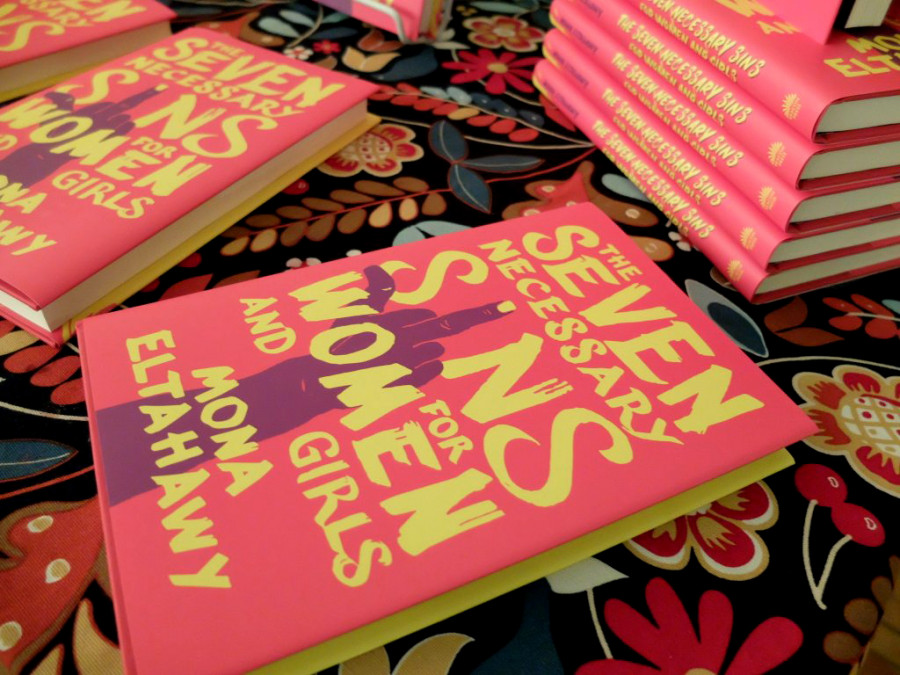A Woman and Girl’s Guide to Fighting the Patriarchy At D&Q
Mona Eltahawy Breaks the Silence & Pushes Feminism Forward Globally
The patriarchy does not want a woman or girl to be angry, ambitious, profane, violent, attention-seeking, lustful, and powerful according to Mona Eltahawy.
“This rage–I poured it into this book because I’m done with sadness. I carried it for so long,” said Eltahawy, clasping her book The Seven Necessary Sins for Women and Girls.
Centered within the shelved walls of La Petite Librairie Drawn & Quarterly, the Egyptian-born feminist author with prominent cherry curls launched The Seven Necessary Sins on Sept. 27.
As sexual assault and violence affects women, girls, and non-binary people every day around the world, The Seven Necessary Sins exists “so marginalized women from other parts of the world could be heard.”
The author pulled everyone’s attention as she read from her introduction titled, “Defying, Disobeying, and Disrupting the Patriarchy.”
“The experience of telling stories, and especially men’s refusal to believe them, was as if I were standing in pouring rain—I could feel it drenching every part of me,” she read, “only to hear the weather forecast on television confidently explaining that it was sunny and dry with not a drop of rain expected.”
Eltahawy travels back and forth between New York City and Montreal. According to her, writing The Seven Necessary Sins in Montreal allowed distance from a lot of what she includes in her book, but the experience also gave her new material.
The author also spoke to her own experiences being sexually assaulted—as a 15-year-old at hajj in Mecca, the holy city in Saudi Arabia and at 50 at a club in Montreal.

When a hand felt her in the Montreal club, she explained how she had decided to follow and tackle the man who groped her, punching him in the face repeatedly.
In 2015, Eltahawy broke the silence for many women and girls when she published her first book titled Headscarves and Hymens: Why the Middle East Needs a Sexual Revolution, which caused controversy by grappling misogyny in the Arab world.
She coined #MosqueMeToo and shared her story amongst many others who experienced the same ordeal during their religious pilgrimages.
Eltahawy also brought up poet and author Audre Lorde, talking about silence and discipline as previous coping mechanisms, which will no longer aid women and girls in their fight against patriarchy.
Lorde’s pivotal statement resonated throughout the silent room, “Your silence will not protect you,” said Eltahawy.
She continued reading from the same excerpt of her introduction, “Being forced to absorb the terrible violation of being sexually assaulted, but also to be robbed of a spiritual experience that so many long to experience forced me to connect that violation with the many other violations I have been subjected to.”
“If you ask most people, especially men, ‘What is patriarchy?’ It’s like asking a fish ‘What is water?’” — Mona Eltahawy
Rather than letting sadness and anger fester inside her, Eltahawy used anger as a “fuel” to cause change. Even then, she knew that was not enough.
Eltahawy brought up the difficulty many people have with understanding the all-encompassing effects of patriarchy, especially in the silencing of women. “If you ask most people, especially men, ‘What is patriarchy?’ It’s like asking a fish ‘What is water?’” she said.
In her chapter “Violence,” she asked, “Well, enough. Why shouldn’t we declare war?”
According to Eltahawy, “Violence–daily acts of violence against women simply for being women –benefits men.” If all those acts of violence were reported, the accumulation of incidents would be recognized as an “epidemic,” “the war–that it is,” said Eltahawy.
“I say, equality is not enough. It’s too late for equality. I want freedom,” said Eltahawy about her ambitions for feminism.
Attendee Violet Cai explained her favourite part of Eltahawy’s reading, “Feminism, at this point, is not just about achieving equality,” she said. “Instead it’s about achieving freedom; I was really impressed by that.”

Eltahawy especially admired the courage of many who marched at the climate strike that same day as the launch. Cai, and another attendee, Jasmine Chakravarty, walked the climate march.
What stood out for Chakravarty was “the idea of being angry,” she said. “We had just been to the climate march and I feel like it sums the whole day up.”
For Chakravarty, it was a day filled with activism.
Measures of self-defense are justifiable when “violence has terrorized us into fear and submission,” said Eltahawy.
She made it clear, however, that before implementing her seven necessary sins, to “just survive,” especially when in possible danger. The safety of women, girls, and non-binary people is a priority for Eltahawy, “the number one lesson in all of this.”
Then, one can defy, disobey, and disrupt the patriarchy. They can also be “really small steps” done in everyday life.
Eltahawy stated that she wants feminism to be piloted by “not whites, the not rich, the not famous, but those who are always marginalized from notions of feminism.”
“I especially want feminism to be led by queer Women of Colour,” she added.



